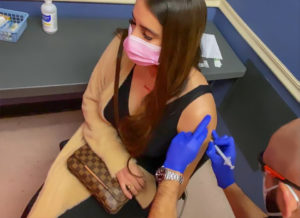 You will probably have questions about the COVID-19 vaccine, especially if you have not taken one yet. You may also wonder if you qualify for or benefit from a booster shot, a topic that has been in the headlines recently.
You will probably have questions about the COVID-19 vaccine, especially if you have not taken one yet. You may also wonder if you qualify for or benefit from a booster shot, a topic that has been in the headlines recently.
COVID-19 vaccination is essential for persons with type 1 or types two Diabetes since they are at higher risk of severe illness and death from the novel coronavirus, according to the CDC. Immunizations are safe and beneficial for these people as stated by experts.
Here are brief discussions on seven things people with Diabetes need to know before or after taking the vaccine:
- Clinical testing revealed no significant adverse effects upon taking the vaccine. A hurting arm, headache, feeling tired and achy for a day or two after having the vaccine, and, in some situations, fever are all common temporary effects. Most of the time, these reactions are indicators that your body is building immunity.
When getting immunizations, it is usual to have some mild-to-moderate adverse effects. The reason for this is that your immune system instructs your body to react in specific manners. Your blood flow must increase, allowing more immune cells to circulate and raising your body temperature to destroy the infection. Vaccines are intended to provide immunity without the risk of spreading the disease.
- The vaccine was not given in a hurry. For more than a decade, scientists have been working on this technology. According to clinical trials and real-world investigations, vaccines are safe and effective. Hundreds of thousands of patients volunteered for the clinical trials, allowing scientists to evaluate the vaccine swiftly rather than waiting years for adequate participants.
These vaccines have a shallow risk of severe side effects. The vaccines are highly safe to use and are highly efficient in preventing primary COVID-19 infections. You don’t have to be worried because physicians will aid you and assess your condition before injection to ensure your safety.
Thousands of volunteers of various ages, races, and ethnicities participated in clinical studies for COVID-19 vaccinations. Vaccine clinical trials evaluate outcomes between vaccinated and unvaccinated people. Considering COVID-19 is still prevalent, clinical vaccination studies have moved more quickly than they would if the disease were less prevalent.
COVID-19 vaccinations have been proven beneficial in these studies, particularly on severe illnesses, and are safe to inoculate for specific individuals who need it.
- Diabetic warning signs and symptoms are essential to be aware of to take preventive actions when any signs appear immediately. According to the CDC, diabetes symptoms include thirst, hunger, frequent urination, unexplained weight loss, impaired vision, and exhaustion. The physicians advise parents, physicians, and caregivers to be aware of Diabetes warning signals.
- The risk of people who have Diabetes aged 18 years below is increasing. It highlights COVID-19 prevention that is why it is necessary to provide actions and preventive efforts for this age group by vaccination and treatment, including all the children and adolescents.
- Even against the Delta variant that is more contagious and is now predominant in most North Carolina, vaccines continue to be extraordinarily effective in reducing the risk of severe illness, hospitalization, and deaths. You don’t have to worry because you are protected once you are fully vaccinated, and it works for your wellness.
- New guidelines and guidance were released due to urgently increasing COVID-19 vaccination coverage and several concerning developments and newly emerging data signals. Even those fully vaccinated are still required to wear their masks, especially in public indoor places, to ensure safety and avoid any possibilities of spreading the disease.
- The Importance of Getting a Vaccine if you have Diabetes is that people under this illness will reduce the chances of severe complications caused by Covid-19. According to a study published in October 2020 in The Lancet Diabetes & Endocrinology, diabetic people have a higher mortality rate during hospitalization compared to those who don’t have it. That is why it is imperative to take the vaccine with intensive care and proper precautions to avoid experiencing the worst-case scenario.
In general, pain, swelling, and redness at the injection site are the most common side effects of the vaccines. Chills, fatigue, and headaches are other frequent adverse effects, as discussed in the previous paragraphs. Some people experience mild side effects, and some experience more severe reactions.
For people who have Diabetes or someone living with a diabetic person, you can take medications and prepare a sick-day kit to treat them after the vaccination if they do not feel well.
If you want to have discounts when buying your medicines on your prescriptions, there are websites and pages that will help you assess your needs. BuzzRx.com for example, offers free and ready-to-use Prescription Discount Cards and can help you in saving up to 80% on your prescriptions! Its main goal is to make communities healthier by making medicines more affordable and accessible.


